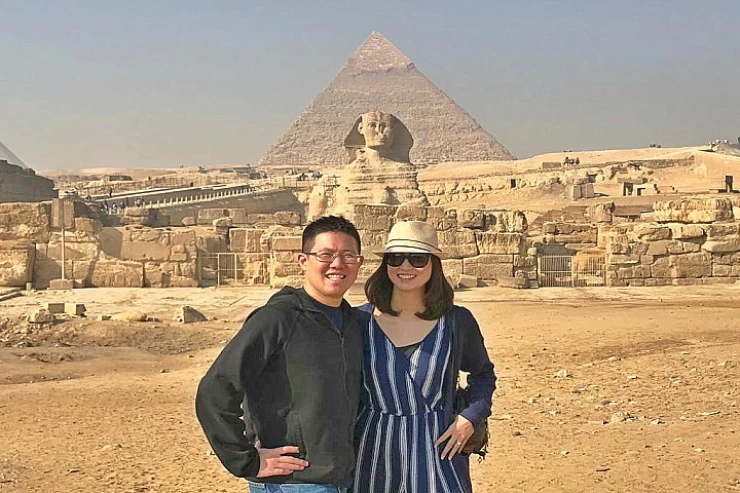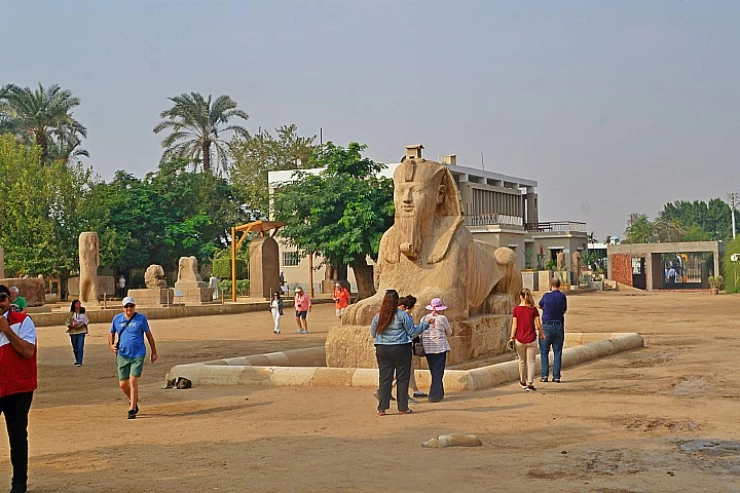Day Trip to Giza Pyramids and Saqqara Necropolis from Cairo
Overview
Discover the wonders of ancient Egypt with our expertly guided day tour from Cairo to the Giza Pyramids and Saqqara Necropolis. Experience the majestic history firsthand as you visit the Pyramids of Giza and the iconic Great Sphinx. In Giza, explore a sprawling ancient cemetery city with tombs, temples, and ancient pathways.
At the Saqqara Necropolis, delve into the rich history of the pyramid and gain insights into its significance in ancient Egyptian civilization. Learn about the diverse individuals interred here spanning from ancient Egyptian to Roman times.
Planning your Egyptian adventure? Consider our meticulously crafted Egypt day tours to explore these extraordinary sites and gain a deeper understanding of Egypt's unparalleled cultural heritage.
Discover the wonders of ancient Egypt with our expertly guided day tour from Cairo to the Giza Pyramids and Saqqara Necropolis. Experience the majestic history firsthand as you visit the Pyramids of Giza and the iconic Great Sphinx. In Giza, explore a sprawling ancient cemetery city with tombs, temples, and ancient pathways.
At the Saqqara Necropolis, delve into the rich history of the pyramid and gain insights into its significance in ancient Egyptian civilization. Learn about the diverse individuals interred here spanning from ancient Egyptian to Roman times.
Planning your Egyptian adventure? Consider our meticulously crafted Egypt day tours to explore these extraordinary sites and gain a deeper understanding of Egypt's unparalleled cultural heritage.
Inclusion
Transportation services from/ to your hotel in Cairo or Giza and return by our representative.
Transports are done by air-conditioned vehicles.
Entrance fees and tickets during the Day Tour to Giza Pyramids and Saqqara are included.
Lunch will be served in a good quality local restaurant.
An English-speaking Egyptologist guide will be with you during Cairo Trips.
Bottled water during all Cairo day tours.
Shopping tours in Cairo or Giza. (Upon request).
Prices include taxes and service charges.
Exclusion
Any extras not specified in Egypt Day Tours itinerary.
Entering the Khufu pyramid from inside. (400 Egyptian pounds).
Camel riding.
Tipping kitty.
Beverage during meals.
Prices are valid during Christmas and New Year tours in Egypt or Egypt Easter tours.
Itinerary
Your tour with Cairo Top Tours begins with a convenient pick-up from any location in Cairo or Giza, marking the start of your immersive Egypt Tours. First, you'll be transported to the renowned Giza Pyramids and the iconic Saqqara Necropolis.
At the Giza Necropolis, you'll encounter the legendary tombs including the Pyramid of Cheops, a marvel recognized as one of the ancient world's Seven Wonders. Nearby, the Pyramid of Chephren, linked with the Great Sphinx—a monumental lion statue with a human head guarding the necropolis for over 4500 years. Adjacent is the Valley Temple of King Chephren, where the king's mummification rituals were performed, and the Pyramid of Mycerinus, featuring small pyramidions housing the king's queens and children.
Following your exploration of the Giza Pyramids, you'll continue to Saqqara Necropolis, home to the grand Step Pyramid of Pharaoh Djoser—the largest and most famous of its kind. Built around 2650 B.C. by the visionary architect Imhotep, this pyramid stands as a testament to ancient engineering, innovatively stacking mastabas (rectangular tombs) to create its distinctive shape.
Enjoy a delightful lunch at a local restaurant during your Egypt Trips, before being comfortably transferred back to your hotel to conclude your enriching Cairo Day Tours.
Price
| Number of Persons | Prices |
|---|---|
| 1 Person | $135 Per Person |
| 2 - 3 Persons | $110 Per Person |
| 4 - 6 Persons | $85 Per Person |
| 7 - 10 Persons | $75 Per Person |
Start from : $75
Check Availability
Related Articles


You Also May Like
Looking for something different? check out our related tour now, or simply contact us to tailor made your Egypt tour
Best Tour to Giza Pyramids and Egyptian Museum in Cairo
Don't miss the chance to be among the first visitors to explore the newly discovered hidden passageway within the Great Pyramid of Giza. Witness the marvels of the world, including the Sphinx and the three iconic pyramids. Additionally, on our Cairo day trip, you can marvel at the remarkable pharaonic artefacts at the Egyptian Museum.
Tour to the Egyptian Museum, Old Coptic and Islamic Cairo
Uncover the importance of Cairo by visiting the Egyptian Museum and marvelling at its impressive exhibits. You can also visit the famous landmarks and churches of Coptic Cairo, which once sheltered the Holy Family and display unique icons. Additionally, enjoy exploring the historic mosques of Islamic Cairo during your visit to Old Cairo.
Cairo Excursions to Giza pyramids, Sakkara and Memphis
Enjoy an extraordinary tour to witness the iconic pyramids of Giza and admire the grandeur of Egyptian pharaohs. Discover the ancient capital of Egypt, decorated with numerous pyramids and tombs, and uncover the hidden secrets during your Cairo excursion.
Cairo Stopover Transit Tour | Cairo Layover Trip during the break
Immerse yourself in a different atmosphere as you venture into the vibrant Khan El Khalili, a bustling open-air marketplace that offers a glimpse into the vibrant culture and traditions of modern-day Egypt. Engage with local artisans, haggle for unique souvenirs, and savour the aromatic spices and flavours that permeate this enchanting setting.
Egypt Trips and Middle East Reviews
Via Egypt Tours, we had a lot of customer reviews, which you can see on our social media accounts, such as Trip Advisor, and YouTube videos regarding how they enjoy Egypt budget tours with our professionals who join them in every inch of Egypt to explain to the travelers the history of each attraction saw on their Egypt and Holy Land Tours.
The highly recommended travel experiences of exploring the iconic Giza Pyramids and delving into the historic wonders of the Saqqara Necropolis. These two incredible sites offer a glimpse into the ancient mysteries and architectural marvels that have defined Egypt's rich history and cultural heritage.
Photography policies at historical sites in Cairo can vary depending on the specific location and the rules set by the site management. However, there are some general guidelines and considerations to keep in mind when taking photographs at historical sites in Cairo:
Entrance Fees: Some historical sites charge an additional fee for photography. Make sure to inquire about any photography fees at the ticket counter when purchasing your entrance ticket.
Restrictions on Flash Photography: Flash photography is often prohibited in many indoor areas of historical sites, such as museums, temples, and tombs. Flash can be damaging to delicate artifacts and paintings. Always follow posted signs and instructions from site staff.
Tripods and Professional Equipment: The use of tripods and professional photography equipment, such as large cameras and drones, may be restricted or require special permits at some historical sites. Check in advance to avoid any issues.
Respectful Photography: Be respectful of the site and other visitors. Avoid blocking pathways or interfering with the experiences of other tourists. Don't touch or lean on ancient structures or artifacts.
Guided Tours: When taking guided tours, your guide can provide information on where photography is permitted and any specific rules that apply at each site.
Security Considerations: Some sensitive areas, including military installations and government buildings, may be off-limits to photography for security reasons. Always respect security personnel's instructions.
Commercial Photography: If you intend to use your photographs for commercial purposes, such as in a travel blog, for sale, or in publications, you may need to obtain special permits or permissions. Check with the relevant authorities.
Cultural Sensitivity: Be mindful of local customs and cultural sensitivities. On some religious sites, it may be inappropriate to take photographs. Always follow any posted guidelines and signs regarding photography.
Time Restrictions: Some historical sites may have specific hours during which photography is allowed, and it may be restricted during certain times of the day or during events.
Private Properties: If you plan to visit historical sites on private properties, such as palaces or estates, photography policies may vary, and you may need permission to take photographs.
Avoiding common travel scams requires vigilance, awareness, and some basic precautions. Scammers often target tourists because they may be unfamiliar with the local environment and customs. Here are tips to help you avoid falling victim to travel scams:
Research Your Destination: Before you travel, research your destination, including common scams reported by other travelers. Knowledge is your best defense.
Stay Alert: Be aware of your surroundings and trust your instincts. If something feels off or too good to be true, it probably is.
Protect Your Belongings: Keep your belongings secure at all times. Use anti-theft bags or wallets, and don't leave valuables unattended in public places.
Beware of Distractions: Scammers often work in pairs or groups. One person may distract you while another steals your belongings. Be wary of overly friendly strangers or sudden disturbances.
Use ATMs Wisely: Use ATMs inside banks or reputable establishments, and be cautious of card skimming devices. Cover the keypad when entering your PIN.
Check Bills and Change: Count your change and inspect bills when making purchases or receiving change to ensure they are not counterfeit or inaccurate.
Research Accommodations: Book accommodations through reputable websites or directly with hotels. Be cautious when booking through unknown or unofficial channels.
Be Skeptical of "Closed" Attractions: If someone tells you that a popular tourist attraction is closed, it might be a ploy to redirect you to a different, overpriced attraction. Verify such information independently.
Negotiate Prices in Advance: When using services like taxis, rickshaws, or street vendors, negotiate prices in advance to avoid surprises and disagreements.
Be Cautious with Guides: If you hire a local guide, make sure they are licensed and reputable. Don't be pressured into hiring a guide on the spot.
Check Official Identification: If someone claims to be a police officer or other official, ask to see their identification. In some countries, scammers impersonate law enforcement.
Ignore Unsolicited Emails and Calls: Don't respond to unsolicited emails, calls, or messages offering prizes, discounts, or lottery winnings. These are often phishing scams.
Use Caution with Wi-Fi: Be careful when using public Wi-Fi networks, as they may not be secure. Avoid accessing sensitive information or making online transactions on unsecured networks.
Purchase Travel Insurance: Travel insurance can provide protection against various travel-related risks, including trip cancellations, medical emergencies, and lost belongings.
Keep Emergency Contacts Handy: Have the contact information for your country's embassy or consulate readily available in case you need assistance while abroad.
Report Suspected Scams: If you encounter a potential scam or fraudulent activity, report it to local authorities or your embassy/consulate and share your experience with fellow travelers online.
Cairo and Giza are home to a wealth of archaeological sites that provide a window into Egypt's rich history and ancient civilization. Here are some of the most prominent archaeological sites in Cairo and Giza:
Giza:
Giza Pyramids: The Giza Plateau is home to three famous pyramids: the Great Pyramid of Khufu (Cheops), the Pyramid of Khafre (Chephren), and the Pyramid of Menkaure. These are among the most iconic and well-preserved pyramids in Egypt.
The Great Sphinx of Giza: Adjacent to the pyramids is the Great Sphinx, a colossal limestone statue with the body of a lion and the head of a pharaoh, believed to represent Pharaoh Khafre.
Pyramid Complexes: In addition to the main pyramids, each pharaoh's tomb includes various temples, causeways, and smaller pyramids for family members. These are integral parts of the archaeological sites.
Solar Boat Museum: Located near the Great Pyramid, this museum houses a reconstructed solar boat that was buried with Pharaoh Khufu to carry him to the afterlife.
Giza Plateau Sound and Light Show: While not an archaeological site in itself, the sound and light show at the Giza Plateau offers a unique experience with a narrated history of the pyramids, accompanied by spectacular lighting effects.
Cairo:
Egyptian Museum: While not an archaeological site in the traditional sense, this museum houses an extensive collection of ancient Egyptian artifacts, including mummies, statues, jewelry, and treasures from King Tutankhamun's tomb.
Saladin Citadel: The historic Citadel of Saladin is home to several well-preserved mosques, palaces, and fortifications, providing insights into the architecture and history of the Islamic period.
Mosques and Madrasas: Cairo boasts numerous historic mosques and madrasas (Islamic schools), such as the Sultan Hassan Mosque and the Al-Azhar Mosque, which showcase stunning architecture and Islamic art.
Khan el-Khalili Market: While primarily a bustling market, Khan el-Khalili's winding streets and historic buildings offer a glimpse into the city's history.
Coptic Cairo: Also known as Old Cairo, this district is home to several ancient Coptic Christian churches, including the Hanging Church and the Church of St. Sergius and Bacchus. The Coptic Museum is also located in this area.
Islamic Cairo: This area is dotted with historic mosques, madrasas, and other Islamic architectural gems, such as the Ibn Tulun Mosque and the Al-Hakim Mosque.
Old Cairo Gates: Gates like Bab Zuweila and Bab al-Futuh are well-preserved relics from the medieval period and offer architectural and historical significance.
Babylon Fortress: Located in Coptic Cairo, the Babylon Fortress is an ancient Roman fortress with remnants of churches and ancient structures.
Egypt's standard electrical voltage is 220 volts at 50 hertz. Sockets are of the European (2-prong, 2-pin plug) variety. If you are traveling from the United States, Canada, or another country where the standard voltage is 110, you will need to pack a power adaptor. You will only need to pack an international travel adaptor plug if you are coming from a country where the standard voltage is 220/240.
Visiting working archaeological sites in Egypt is generally restricted to authorized personnel, archaeologists, researchers, and professionals directly involved in excavation and preservation work. However, tourists interested in archaeology and history can engage in educational programs or tours that offer insights into Egypt's ancient sites and archaeological practices without actively participating in digs.
- Educational Tours.
- archaeological field schools.
- Museum Workshops.
- visiting archaeological sites.
- Public lectures and events
The oldest stone pyramid and a notable building in Egyptian architectural history is the Step Pyramid of Djoser.
Mastabas: Old tombs adorned with elaborate ornamentation and carvings.
The Unas Pyramid is well-known for its pyramidal writings.
Exhibiting items from the Saqqara necropolis is the Imhotep Museum.


Cairo Top Tours Partners
Check out our partners






























